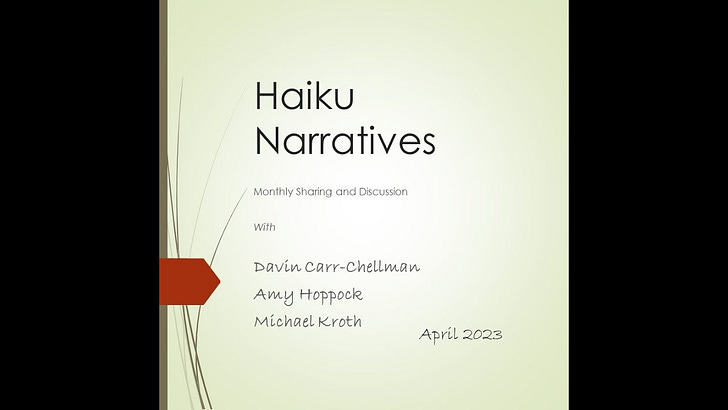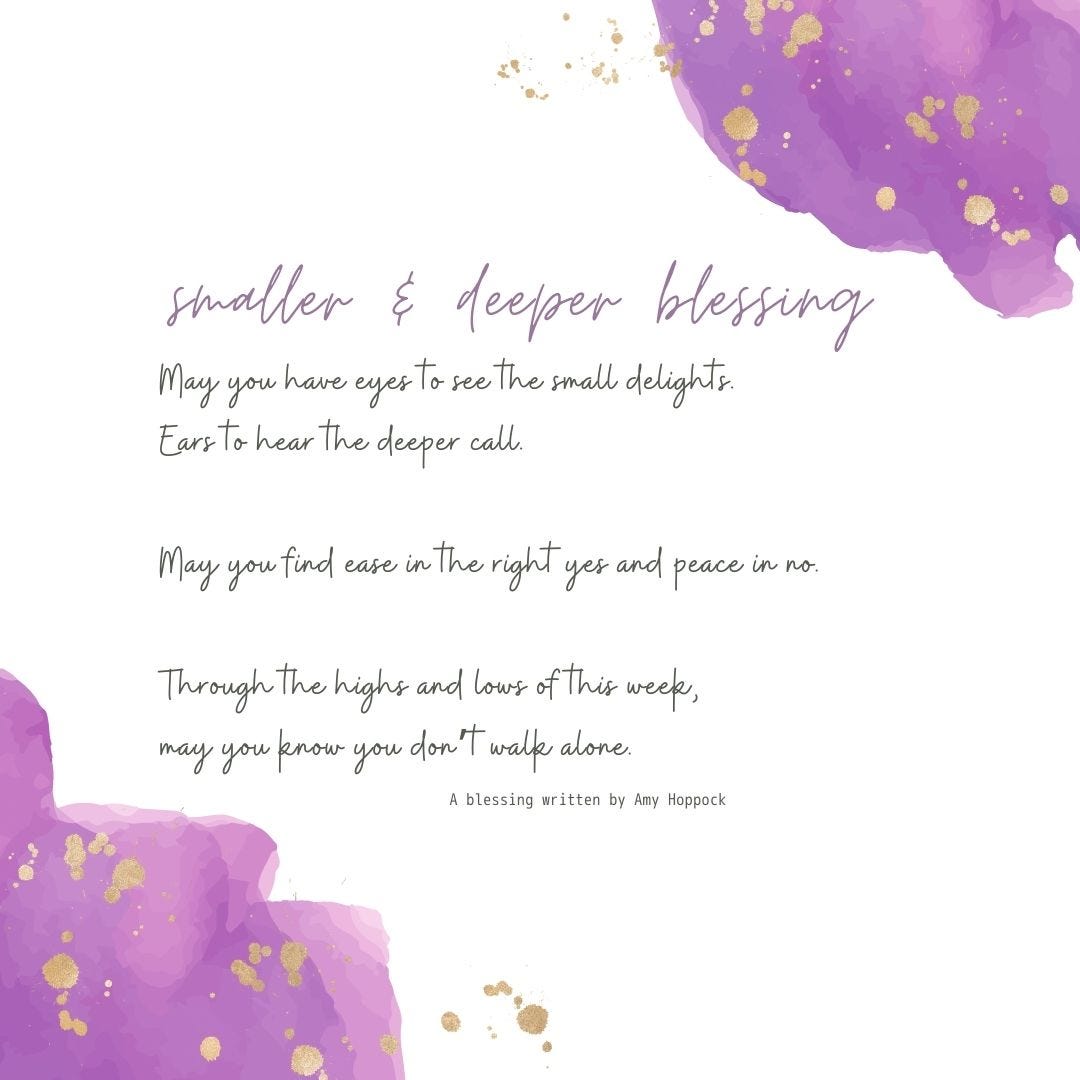Five years ago, I accepted a random invitation to join a haiku group. The commitment was to write haiku, choose one each month to share, create a postcard, share the art/haiku card, receive two others, and write a response (haibun) to each haiku and engage in a conversation about each haiku and haibun once a month. Five years later, we are still at it. It's my favorite conversation of the month because it's unexpected, profound, and always awe-inspiring. It's filled with wisdom, creativity, grace, and faith. It's the kind of conversation we might all long to have but need places or people to have them with. Today, I'm sharing my April haiku and response. I share the recorded conversation every month, but I'm sharing my written response today, along with a few reflections about the practice of writing haiku.
The practice of haiku has enriched my life in so many surprising ways.
Writing haiku has taught me to find the essence, to see through the adjectives to the verb and noun. With its seventeen-syllable form, there isn't room for adjectives and wandering prose to find meaning. I have to distill before I write the one thing that moved me that caught my attention. I have to dig deeper; sure, the flowers and birds are beautiful and engaging, but haiku asks, why? Why this bird? Why this flower? It's a way to get to the heart and soul quicker. With just seventeen syllables, not even words, there isn't the luxury of extra words to describe a scene, moment, or feeling. (One might observe that haiku is a smaller and deeper practice at its very core.)
Haiku has taught me to keep my eyes and ears open, alert, and aware. The commitment to write at least one meaningful, worth-sharing haiku each month is a pressure that keeps me subtly engaged in my daily rounds in a way I'm not sure I would be without the gentle, positive pressure to present my fellow haiku authors with something of meaning.
Haiku has invited me into a larger appreciation of poetry in general. Maybe it's something you've noticed even in the evolution of this newsletter. I look to poets for words, guidance, insight, and beauty more than ever.
Finally, haiku has taught me the power of form. The form of haiku is five, seven, five syllables. There is something powerful about being confined by an ancient, agreed-upon structure. The longer I work with the form, the more I appreciate the simple structure's challenges and gifts. I find myself counting syllables and thinking this word is three syllables. Am I willing to use three of my five syllables for this word? Can I find a two-syllable word that completes the idea? The form teaches and enforces an economy of use beyond syllables; it's about meaning, wisdom, beauty, and invitation. I want my words to communicate the soul, the beautiful, and invite the reader to their own reflections and grace.
My April 2023 haiku and haibun (response)
"torrents of oblivion made me afraid" (psalms 18)
unaware, unseen
oblivion is common
look, see, unafraid
In my daily reading a few months back, this line from Psalms 18 caught my attention. I'm unsure what exact translations I was reading, but I jotted it down in my Haiku notebook and wrote this haiku in response.
I liked this line because this line feels real. It gives a description I can understand to movements that I can't make sense of. Fear is everywhere; if left unchecked, these people will do this, and those people, if we "let" them, will do this. The potential of danger, fear, and loss permeates the air we breathe and the voices we hear. It's everywhere.
Torrents of oblivion made me afraid. Torrents are rushing, flooding water. Something powerful, unexpected, on the move. There is a sense that one could be sucked under when a torrent is headed in our direction. But torrents are everywhere; social media is a torrent of information, entertainment, and fear tailor-made to lull us into oblivion.
Oblivion is unaware or unconscious. While oblivion is a seemingly easy choice, the potential for oblivion to create a torrent that, instead of insulating us from the fear we are trying to run from, actually increases fear.
I wonder if the antidote to torrents of oblivion is access to and awareness of our deepest depths, finding and dwelling in divine peace through awareness of all the voices trying to grab our attention. Awareness, seeing, accessing our deepest depths, listening to and curating the voices, seems like the narrow path through torrents of oblivion.
You can watch our April conversation. If you subscribe to Profound Living, you'll receive a monthly notification in your inbox when we share our conversation.

Try writing a haiku or two or seven this week! (Really, try it! It’s fun, I promise!)
Some of my best haiku writing tips:
I like to use a line that “sparkled” as inspiration for writing a haiku (torrents of oblivion…)
Sometimes I find inspiration or a start from a word, either a word that seems interesting, beautiful, or challenging. (Words like tendency, folded, slowly)
I often write a haiku and then play with the syllables and even lines to find the final haiku. Sometimes the first line becomes the third. Even seventeen syllables need to be edited and refined.
April was a rough reading month for me, but I think with May flowers, I’m getting my reading groove back! (I finished four books this week, so I think that bodes well!)
White Bird by R.J. Palacio
This is a graphic novel that my 12-year-old daughter asked me to read. It’s an expanded version of the Julien chapter of Wonder. (If you know, you know, if you don’t know, may I recommend that you read Wonder with the Julien chapter as soon as possible.) This might be the first graphic novel I’ve read, I was honestly skeptical, but I really enjoyed the story and the form. It’s the story of a young woman who hides in a barn in France during the Nazi occupation. I loved it; such an important book for our children to read.
The Codebreaker’s Secret by Sara Ackerman
This is the fictional story of American codebreakers in Hawaii during WWII working on the Japanese codes. I have read several books about the British code breakers (The Rose Code by Kate Quinn is my favorite.) I enjoyed this book. It is about an interesting topic and time in history, including a mystery and flash-forward scenes to where the characters end up after the war. I listened to this as an audiobook and really enjoyed the experience.

I can’t believe I have never googled “quotes about writing haiku”-I have now, and I found so many rich ideas, observations, and challenges. These are just a few of my favorites. May they be an invitation to your own haiku practice or serve as a personal invitation to a new way to view life.
“Haiku is not a shriek, a howl, a sigh, or a yawn; rather, it is the deep breath of life.”
― Santoka Taneda, Mountain Tasting: Haiku and Journals of Santoka Taneda
“Real haiku is the soul of poetry. Anything that is not actually present in one's heart is not haiku. The moon glows, flowers bloom, insects cry, water flows. There is no place we cannot find flowers or think of the moon. This is the essence of haiku. Go beyond the restrictions of your era, forget about purpose or meaning, separate yourself from historical limitations—there you will find the essence of true art, religion, and science.”
― Santoka Taneda, Mountain Tasting: Haiku and Journals of Santoka Taneda
“Reading haiku is as much an art as writing it. The reader needs to pause and listen to the silences, to feel the spaces between the words, and to journey into the depths of many multi-colored worlds.”
— Harley King
Haiku is an art that seems dedicated to making people pay attention to the preciousness and particularity of every moment of existence. I think that poetry can do that. -Robert Hass
I seldom feel trapped by my world. Setting up rules and restrictions is part of the process. It gives your world shape. I always look at these things like haiku: you have to work within certain parameters, but within them, you’re completely free.
Richard Kadrey








